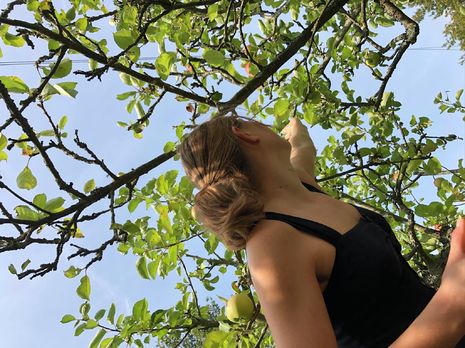Wassailing into the New Year
In order to celebrate a renewed sense of connection with nature, and gratitude for what it gives us, Lola Rose Wood embraces an ancient pagan ritual.

In previous years we’ve never found the time to properly harvest our apple trees. Lucky though we are to be living in one of the sunniest spots in England with our own little orchard full of gnarly old apple trees, up until now we’ve failed to make the most of it. We always make as much apple crumble as our freezer can take and deliver suitcases of fruit to our grandparents, but the majority of our apples are destined to lie rotting on the grass as lunch for the wasps. Not this year. With universities and schools cancelled and my parents working from home, we finally had the time – and the boredom – to spend our days pushing wheelbarrows and climbing step-ladders to shake the heavily-laden boughs until they rained apples. All in all, we managed to press enough apples for 300 bottles of juice (Christmas presents sorted), so this New Year felt like the perfect opportunity to say thank you to our orchard for everything it had gifted us: for the sunny afternoons spent sketching in its shade; for the branches to tie bunting to on birthdays; for bringing us together as a team at harvest time. We wanted a way of celebrating the renewed sense of connection we felt to the land, a recognition of how inescapably entrenched our life is within nature’s cycles. So we went a-wassailing.
“Here we come a-wassailing, among the leaves so green!” Most will recognise the first line of this catchy Christmas carol, but few can say they’ve ever experienced (or know the meaning of) the rural tradition of wassailing. An ancient pagan ritual involving flaming torches, bowls of mulled cider and raucous singing, at its core, Wassailing is one big excuse for a party, a centuries-old excuse for groups of rowdy men to wander around the town getting drunk and demanding free alcohol. Usually practiced on Twelfth Night (January 5th), Wassailing is essentially a toast to trees; rural communities join together and travel from orchard to orchard, reading blessings and singing songs to their trees, all in the hope of ensuring a bountiful harvest of apples and pears next year. Although our wassail was just the five of us this year, I’d say we still drank enough cider for a small village.
“We wanted a way of celebrating the renewed sense of connection we felt to the land, a recognition of how inescapably entrenched life is within nature’s cycles.”
While coronavirus means you won’t catch us drinking from a communal cup anytime soon, in the 17th century (long before Pasteur’s Germ Theory) revellers downed hot, spiced cider from a communal Wassail bowl. This communal germ cup was ironically believed to bring the drinker good health, being traditionally carved from Lignum Vitae (literally ‘tree of life’). The word ‘wassail’ is thought to be derived from the Old English ‘was hál’, meaning ‘be hale’ or ‘good health’.
Wassailing first began in the lush green pastures and muddy woodlands of 5th century Kent – often called ‘The Garden of England’, despite a recent and unfair rebranding as ‘The Toilet of England’ by anti-Brexiteers. As I was reminded during my brief lockdown running career, Kent is brimming with cider orchards and apple trees; I spent most of my runs winding between endless rows of pale pink blossom and pears waiting to become Perry. We had our own orchard to celebrate, but all you need for a Wassail is a single fruit tree or even a sapling, so there’s nothing stopping everyone from joining in.
Our ‘torchlight procession’ turned out to be my mum carrying a candle, my dad a torch and me wearing an LED beanie to avoid falling down any rabbit holes as we squelched through the mud. Aside from that, we began our Wassail the traditional way: by throwing handfuls of salt at our ‘Queen’ apple tree, once bursting with blossom and fruit, but now completely bare, aside from a few forgotten baubles of wizened black apples. Next, we tucked slices of toast into the main nook of the apple tree, nestling Warburtons Seeded Loaf onto moss-furred branches between sea-green scabs of lichen. Sadly, this step did not involve skewering toast onto the ends of every bare branch like I was hoping for. We then poured a cup of mulled cider over the bread, presumably for all the alcoholic birds. After this, we read a traditional Wassail prayer for “every twig and apples big” which ends with the cry “Hollar boys, hollar!” – the call for us to begin banging our pots, pans and saucepan lids together as loudly as possible.
Despite the annoying androcentrism of the cry, I couldn’t get enough of it. The pots and pans banging, while primarily a drunken laugh, is traditionally to create enough of a racket to scare away any evil spirits while also pleasing the spirits of the fruit trees. To top it all off, we sang the Wassailer’s carol loud enough to wake the neighbours. Then we sang it again, because our ‘strong Kentish Cider’ from Biddenden had an alcohol percentage of 9%, meaning we were on our way to a Frosty Jack’s level of raucousness.
As I roused myself to consciousness the next day, with pans seemingly still clanging in my skull, I looked out upon my cider-soaked apple trees with a newfound affection. Even if I do have to spend another year slowly going mad at home, there will always be beauty and respite for me among the trees.
 Comment / Plastic pubs: the problem with Cambridge alehouses 5 January 2026
Comment / Plastic pubs: the problem with Cambridge alehouses 5 January 2026 News / Cambridge businesses concerned infrastructure delays will hurt growth5 January 2026
News / Cambridge businesses concerned infrastructure delays will hurt growth5 January 2026 News / New movement ‘Cambridge is Chopped’ launched to fight against hate crime7 January 2026
News / New movement ‘Cambridge is Chopped’ launched to fight against hate crime7 January 2026 News / AstraZeneca sues for £32 million over faulty construction at Cambridge Campus31 December 2025
News / AstraZeneca sues for £32 million over faulty construction at Cambridge Campus31 December 2025 Interviews / You don’t need to peak at Cambridge, says Robin Harding31 December 2025
Interviews / You don’t need to peak at Cambridge, says Robin Harding31 December 2025










